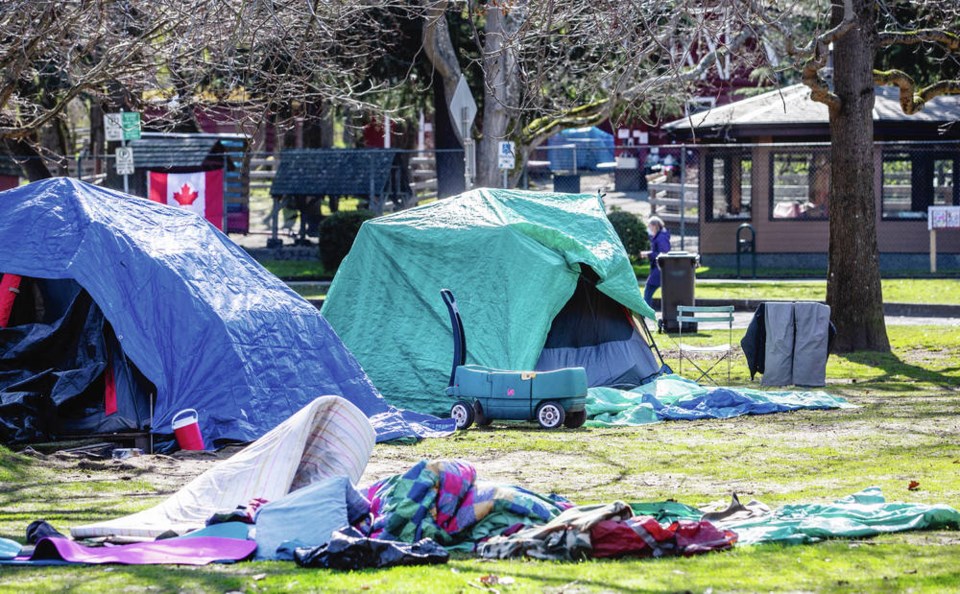A commentary by a professor of Canadian history at the University of Victoria.
On a beautiful day last week I had a chance to walk through James Bay to Fairfield. This took me through Beacon Hill Park, a route I hadn’t taken for a while.
The park in many ways looked as it always does on a sunny spring day, with spring blossoms, ducks and peacocks. And it now also includes many tents, for those members of our community who have nowhere else to live, even during snowy and stormy days and freezing nights.
The Times Colonist letters page has recently included many letters from writers unhappy about the presence of unhoused people living in the park.
While some members of the Victoria community are doing all they can to support those with nowhere else to live, the letters point to other attitudes — of fear, of disrespect and a sense that some are considered lesser, other, and not worthy of being seen as part of our community.
COVID-19 has created many difficulties for us all. For the first time, we have had to see our own bodies as potentially dangerous to everyone around us — and their bodies as harbouring potentially lethal danger to us.
This is a dramatically new idea for most of us. It has made us much more suspicious of each other, and more afraid.
While many have dealt with these new realities by becoming suspicious of everybody, some of us do so by becoming more public, and more vocal, regarding long-held beliefs that “other” bodies — brown or black or poor — are the most dangerous.
Sadly, this approach has many ugly historical precedents. It also ignores the realities that the social and economic inequalities that many of us accept and benefit from make the marginalized among us more vulnerable to increased poverty during the pandemic, as well as to increased rates of infection and death.
Anti-Indigenous and anti-Asian racism have a long and brutal history in Victoria, and in British Columbia more generally, including the dispossession of Indigenous land, and Asian exclusion laws.
This racism has never disappeared. But in the past few decades the most in-your-face racism, where Indigenous people could casually and regularly be refused service in restaurants and stores, and Asian people harassed and beaten up on the streets with no recourse, seemed like a thing of the past.
Actions no longer acceptable in our so-called more enlightened society. But COVID-19 fears have seen such behaviour resurface in frightening ways.
We have seen this clearly in the increased racism facing Indigenous people in the Cowichan area following the announcement of COVID cases in the Indigenous community, and the growing number of incidents of often-violent anti-Asian racism throughout the province.
Increased racism has been paired with increasingly vocal hostility toward the unhoused, who with the social distancing requirements of COVID, can no longer be hidden away in shelters. As a temporary option, governments, who provided no alternative, allowed them to remain full-time in the parks.
Homeless encampments are not new in Canada. These encampments were very visible during the Depression, particularly on the West Coast. This was a time when Canada was a much less wealthy country than it is today.
While the provincial government has provided housing for some of the unhoused, many remain in the parks. While some within the community are providing support, other attitudes are troubling, and again point to ongoing beliefs about who belongs in our community, and who does not.
Suggestions that forcing the homeless into “honest work” in the fields and into locked institutions echo solutions that have been discredited decades ago.
I am not suggesting that our society is currently providing adequate answers or support for those among the unhoused who are dealing with substance or mental-health issues. But the pressures of COVID-19 do not appear to be moving us towards better solutions, but rather towards the discredited, cruel and divisive options of the past.
The fact that the COVID crisis has enabled racism and disrespect for the poor to emerge with such public ferocity points to the continuing, if perhaps more subterranean, force such attitudes have retained among many British Columbians over the last few decades.
And it suggests that a post-COVID recovery requires a serious reckoning with past and ongoing racism and inequalities in Victoria and British Columbia.



